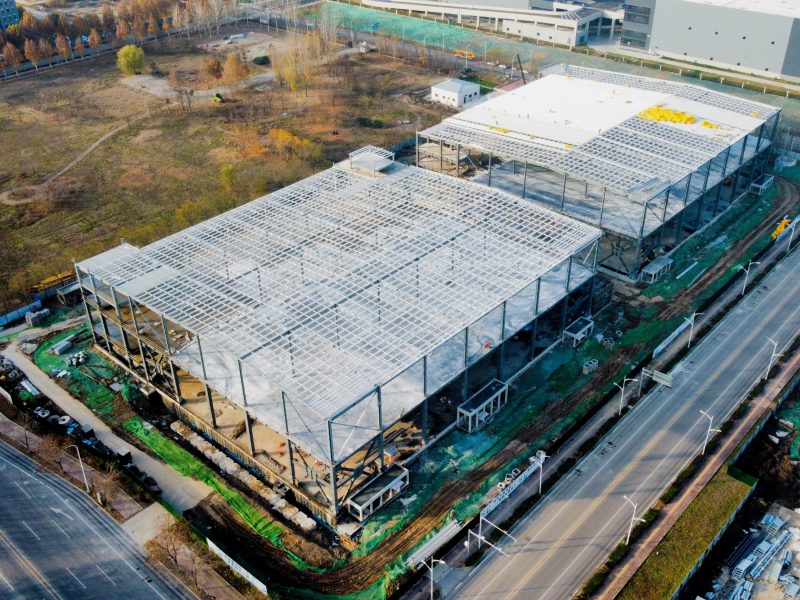
Modular Prefabricated Factories: Fast, Flexible, and Scalable Manufacturing Solutions
Manufacturing companies today require factory buildings that are not only durable but also flexible and rapidly deployable. Traditional factory construction can be expensive, time-consuming, and rigid, often delaying production timelines.
Modular prefabricated factories provide a modern solution, combining prefabrication, scalability, and cost-efficiency. This article explores the benefits, design considerations, and applications of modular prefabricated factories for B2B manufacturing clients.
What Are Modular Prefabricated Factories?
Modular prefabricated factories are built from steel frames, insulated panels, and prefabricated modules manufactured off-site. These modules are transported and assembled on-site, ensuring high-quality construction and rapid deployment.
Unlike traditional factories, modular prefabricated designs allow customization in layout, ceiling height, storage areas, and production lines. They can be expanded or reconfigured to meet evolving business needs without halting operations.
Key Advantages of Modular Prefabricated Factories
- Rapid Construction
Prefabrication and modular assembly reduce construction time, allowing factories to become operational in weeks rather than months. - Durability and Strength
Steel frames provide resistance against fire, pests, and extreme weather, ensuring long-term structural integrity. - Cost Efficiency
Reduced labor, material waste, and shorter construction timelines result in significant savings for B2B clients. - Flexibility and Scalability
Modular designs allow horizontal or vertical expansion, enabling businesses to grow without major disruption. - Customizable Layouts
Interiors can be configured for production lines, storage, assembly, offices, or specialized manufacturing needs. - Energy Efficiency
Insulated panels and energy-efficient systems reduce operational costs and support sustainability. - Safety Compliance
Prefabricated factories meet industrial safety standards, including load-bearing, fire resistance, and accessibility requirements.
Design Considerations for Manufacturing Clients
B2B clients should focus on:
- Workflow Optimization: Layouts should facilitate efficient material flow and production processes.
- Structural Requirements: Ensure modules support machinery, storage racks, and production equipment.
- Ventilation and Lighting: Incorporate natural lighting and mechanical ventilation for worker safety and comfort.
- Future Expansion: Modular units should allow seamless addition of new spaces.
- Operational Integration: Connect easily with offices, warehouses, and logistics areas.
Applications Across Industries
Modular prefabricated factories are suitable for:
- Automotive Manufacturing: Production facilities with customizable assembly lines.
- Electronics Manufacturing: Clean and controlled modular factories for sensitive components.
- Food and Beverage Processing: Scalable units for production and storage, meeting hygiene standards.
- Textile Manufacturing: Flexible factories with configurable layouts for different processes.
- Construction Materials Production: Durable modular factories for concrete, steel, and other building materials.
Case Studies
- Automotive Plant (Germany):
Constructed modular prefabricated factory with integrated assembly lines. Reduced setup time by 60% and allowed immediate production. - Electronics Manufacturing Facility (USA):
Built modular factory with clean room integration. Prefabrication reduced on-site work and minimized operational downtime. - Food Processing Plant (Australia):
Installed modular prefabricated factory for packaged goods. Energy-efficient panels improved sustainability while ensuring compliance with hygiene standards.
Why B2B Clients Should Consider Modular Prefabricated Factories
Modular prefabricated factories offer clear benefits for manufacturing clients:
- Speed: Rapid deployment accelerates operational readiness.
- Durability: Steel structures withstand industrial use and environmental conditions.
- Cost Savings: Reduced construction and maintenance costs.
- Flexibility: Modular design allows reconfiguration or expansion.
- Operational Efficiency: Optimized layout improves production workflow.
- Sustainability: Energy-efficient designs and recyclable materials support eco-friendly manufacturing.
For B2B clients, modular prefabricated factories are a strategic investment that combines durability, flexibility, and operational efficiency.
Conclusion
Modular prefabricated factories are transforming industrial manufacturing by providing fast, flexible, and cost-effective building solutions. Prefabrication, modular layouts, and energy-efficient designs optimize production, reduce downtime, and support sustainable growth.
For manufacturing clients seeking durable, scalable, and adaptable facilities, modular prefabricated factories offer a practical and strategic solution for modern industrial operations.
